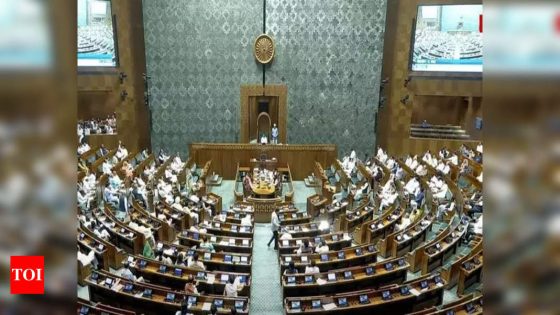NEW DELHI: Amid opposition’s demand that it be sent to a joint committee, the govt is set to introduce the Wakf (Amendment) Bill, 2024, in Lok Sabha on Thursday that proposes far-reaching changes to restrain the powers of Wakf Boards to declare a property as ‘Wakf’ and introduce a detailed process to do so, including preliminary survey by the district magistrate instead of the survey officer of the board as a pre-requisite for any such determination.
The bill seeks to broaden the composition of the Central Wakf Council and state Wakf Boards by providing for representation of Muslim women and non-Muslim members. The bill also provides for a full-time chief executive officer of Wakf Boards to be appointed by the state govt and who shall not be below the rank of joint secretary to the state govt and not necessarily a Muslim.
The most critical of the proposed amendments relates to the repeal of Section 40 of the existing law that empowers Wakf Boards to decide if a property is a Wakf asset, change in the composition of Wakf tribunals and allowing for appeals in high courts against their decisions within 90 days.
Bid to introduce transparency, accountability in Wakf boards | page 9
The govt is set to introduce a bill to amend the Wakf Act, 1995, to check the unbridled powers, enhanced futher by a 2013 amendment, of Wakf Boards in what has been termed an attempt to introduce transparency and accountability in the regulation and monitoring of over 8.7 lakh properties under control of state boards across the country and weed out corruption. TOI explains what comprises Wakf and what is ailing management of assets under the boards.
What is Wakf and what does it comprise in terms of assets?
Wakf refers to properties dedicated exclusively for religious or charitable purposes under Islamic law. Once designated as Wakf, ownership is transferred from the person making the Wakf (waqif) to Allah, making it irrevocable. These properties are managed by a mutawwali, appointed by waqif or a competent authority. Wakf boards control 8.7 lakh properties spanning 9.4 lakh acres across India, with estimated value of Rs 1.2 lakh crore. There are 32 Wakf boards, including two Shia Wakf boards (in Uttar Pradesh & Bihar).
What are the challenges posed by the irrevocability of Wakf?
Once a property is declared Wakf, it remains so forever. This irrevocability has led to various disputes and claims, some of which, like the claim on two islands in Bet Dwarka, have perplexed courts. Examples of some other disputes include the Bengaluru Eidgah ground, claimed as Wakf property from the 1850s, and the Surat Municipal Corporation building, claimed due to its historical use as a ‘sarai’ during Haj in the Mughal era. Kolkata’s Tollygunge Club and Royal Calcutta Golf Club are on Wakf land, so is ITC Windsor Hotel in Bengaluru. Encroachment on Wakf properties is also a challenge.
How did Wakf and its law evolve?
The concept of Wakf in India dates back to Delhi Sultanate, with early examples including Sultan Muizuddin Sam Ghaor’s (Muhammad Ghori) dedication of villages to Jama Masjid of Multan. Mussalman Wakf Act, 1923, marked the first attempt to regulate it. In independent India, the Wakf Act was first passed by Parliament in 1954. It was replaced by a new Wakf Act in 1995 which gave more power to Wakf boards. The accretion of power has been accompanied by increase in number of complaints of encroachment and illegal lease and sale of Wakf properties. In 2013, the Act was amended and the changes, many argue, conferred unlimited powers on Wakf boards to claim properties in the name of Muslim charity. The amendments made sale of Wakf properties impossible. Neither the mutawwali (custodian) nor the Wakf board has rights to sell a Wakf property.
How are the sweeping powers sought to be curbed under the bill?
Section 40 of the Wakf Act, 1995, gives Wakf boards the power to decide if a property is Wakf property. There are complaints this power has been misused by vested interests for property grab with the help of the corrupt Wakf bureaucracy. There have also been allegations of misuse of powers given to boards regarding appointment of mutawwalis and cases challenging appointment of managers. The bill proposes to repeal the controversial section altogether and vest powers in the collector. Interestingly, even countries that follow Muslim law do not have a Wakf body with such powers.
How has the definition of Wakf changed from 1923 to 2013?
The main change in definition was made in 2013, when the expression ‘permanent dedication by a person professing Islam’ was replaced by ‘permanent dedication by any person’. After this amendment, it is believed Wakf has opened the floodgates for dedication of property to Wakf boards by any person.
How cases and complaints have piled up
Disputes have mounted over the years, and the Wakf bureaucracy has been criticised for inefficacy, leading to issues like encroachment, mismanagement, ownership disputes, and delays in registration and surveys. There are 40,951 cases pending in tribunals which are part of the Wakf system. The problem is compounded by the absence of judicial oversight on decisions of tribunals which exclusively comprise members of Wakf bureaucracy. The law has been under growing public scrutiny after 2013, with complaints coming from Muslim intellectuals, women and different sects such as Bohras, and OBC Muslims.
Flaws in the appeal process are also a big concern. For instance, an appeal against a board decision lies with the tribunal but the latter has no timeline for disposal of cases. The tribunal’s decision is final and there is no provision for appeal except under writ jurisdiction in high courts. Moreover, some states don’t have tribunals, making the Wakf bureaucacy the ultimate arbiter.
In states with a single Wakf board, the need is felt to have representation from minority sects among Muslims, like Bohras and Shias, as well as OBC Muslims, the Pasmandas. Misuse of ‘Wakf-al-Aulad’ provision to deny inheritance rights to women and orphans in certain cases is another concern sought to be aaddressed by the bill.
What did Sachar Committee and other panels say on the Wakf system?
Sachar Committee’s 2006 report recommended need for regulation, efficient management of records, inclusion of non-Muslim technical expertise in Wakf management and bringing Wakf under the scheme of financial audit, among other things. Similarly, the joint parliamentary committee’s report on Wakf presented to Rajya Sabha in March 2008 recommended revamping the composition of Wakf boards, proposing appointment of a senior officer as CEO for state Wakf boards, stringent action for unauthorised alienation of Wakf properties, stringent punishment to mutawwalis for corruption, creating scope for intervention by HC in some cases, computerisation of Wakf boards and adequate representation to the Shia community in the Central Wakf Council.
What’s the broader idea behind the amendments?
The idea, govt says, is to modernise management of Wakf properties, protect women’s rights, ensure fair representation in Central Wakf Council and Wakf boards, reduce litigation, have effective coordination with revenue dept and also provide judicial oversight on tribunal decisions.
What’s the Muslim Personal Law Board saying?
The All India Muslim Personal Law Board has called the bill an interference with personal laws, and threatened to start a mass movement. But the All India Sufi Sajjadanashin Council, the apex body representing Sufi shrines, has welcomed govt’s proposal alleging Wakf boards work in a “dictatorial” manner.
The bill seeks to broaden the composition of the Central Wakf Council and state Wakf Boards by providing for representation of Muslim women and non-Muslim members. The bill also provides for a full-time chief executive officer of Wakf Boards to be appointed by the state govt and who shall not be below the rank of joint secretary to the state govt and not necessarily a Muslim.
The most critical of the proposed amendments relates to the repeal of Section 40 of the existing law that empowers Wakf Boards to decide if a property is a Wakf asset, change in the composition of Wakf tribunals and allowing for appeals in high courts against their decisions within 90 days.
Bid to introduce transparency, accountability in Wakf boards | page 9
The govt is set to introduce a bill to amend the Wakf Act, 1995, to check the unbridled powers, enhanced futher by a 2013 amendment, of Wakf Boards in what has been termed an attempt to introduce transparency and accountability in the regulation and monitoring of over 8.7 lakh properties under control of state boards across the country and weed out corruption. TOI explains what comprises Wakf and what is ailing management of assets under the boards.
What is Wakf and what does it comprise in terms of assets?
Wakf refers to properties dedicated exclusively for religious or charitable purposes under Islamic law. Once designated as Wakf, ownership is transferred from the person making the Wakf (waqif) to Allah, making it irrevocable. These properties are managed by a mutawwali, appointed by waqif or a competent authority. Wakf boards control 8.7 lakh properties spanning 9.4 lakh acres across India, with estimated value of Rs 1.2 lakh crore. There are 32 Wakf boards, including two Shia Wakf boards (in Uttar Pradesh & Bihar).
What are the challenges posed by the irrevocability of Wakf?
Once a property is declared Wakf, it remains so forever. This irrevocability has led to various disputes and claims, some of which, like the claim on two islands in Bet Dwarka, have perplexed courts. Examples of some other disputes include the Bengaluru Eidgah ground, claimed as Wakf property from the 1850s, and the Surat Municipal Corporation building, claimed due to its historical use as a ‘sarai’ during Haj in the Mughal era. Kolkata’s Tollygunge Club and Royal Calcutta Golf Club are on Wakf land, so is ITC Windsor Hotel in Bengaluru. Encroachment on Wakf properties is also a challenge.
How did Wakf and its law evolve?
The concept of Wakf in India dates back to Delhi Sultanate, with early examples including Sultan Muizuddin Sam Ghaor’s (Muhammad Ghori) dedication of villages to Jama Masjid of Multan. Mussalman Wakf Act, 1923, marked the first attempt to regulate it. In independent India, the Wakf Act was first passed by Parliament in 1954. It was replaced by a new Wakf Act in 1995 which gave more power to Wakf boards. The accretion of power has been accompanied by increase in number of complaints of encroachment and illegal lease and sale of Wakf properties. In 2013, the Act was amended and the changes, many argue, conferred unlimited powers on Wakf boards to claim properties in the name of Muslim charity. The amendments made sale of Wakf properties impossible. Neither the mutawwali (custodian) nor the Wakf board has rights to sell a Wakf property.
How are the sweeping powers sought to be curbed under the bill?
Section 40 of the Wakf Act, 1995, gives Wakf boards the power to decide if a property is Wakf property. There are complaints this power has been misused by vested interests for property grab with the help of the corrupt Wakf bureaucracy. There have also been allegations of misuse of powers given to boards regarding appointment of mutawwalis and cases challenging appointment of managers. The bill proposes to repeal the controversial section altogether and vest powers in the collector. Interestingly, even countries that follow Muslim law do not have a Wakf body with such powers.
How has the definition of Wakf changed from 1923 to 2013?
The main change in definition was made in 2013, when the expression ‘permanent dedication by a person professing Islam’ was replaced by ‘permanent dedication by any person’. After this amendment, it is believed Wakf has opened the floodgates for dedication of property to Wakf boards by any person.
How cases and complaints have piled up
Disputes have mounted over the years, and the Wakf bureaucracy has been criticised for inefficacy, leading to issues like encroachment, mismanagement, ownership disputes, and delays in registration and surveys. There are 40,951 cases pending in tribunals which are part of the Wakf system. The problem is compounded by the absence of judicial oversight on decisions of tribunals which exclusively comprise members of Wakf bureaucracy. The law has been under growing public scrutiny after 2013, with complaints coming from Muslim intellectuals, women and different sects such as Bohras, and OBC Muslims.
Flaws in the appeal process are also a big concern. For instance, an appeal against a board decision lies with the tribunal but the latter has no timeline for disposal of cases. The tribunal’s decision is final and there is no provision for appeal except under writ jurisdiction in high courts. Moreover, some states don’t have tribunals, making the Wakf bureaucacy the ultimate arbiter.
In states with a single Wakf board, the need is felt to have representation from minority sects among Muslims, like Bohras and Shias, as well as OBC Muslims, the Pasmandas. Misuse of ‘Wakf-al-Aulad’ provision to deny inheritance rights to women and orphans in certain cases is another concern sought to be aaddressed by the bill.
What did Sachar Committee and other panels say on the Wakf system?
Sachar Committee’s 2006 report recommended need for regulation, efficient management of records, inclusion of non-Muslim technical expertise in Wakf management and bringing Wakf under the scheme of financial audit, among other things. Similarly, the joint parliamentary committee’s report on Wakf presented to Rajya Sabha in March 2008 recommended revamping the composition of Wakf boards, proposing appointment of a senior officer as CEO for state Wakf boards, stringent action for unauthorised alienation of Wakf properties, stringent punishment to mutawwalis for corruption, creating scope for intervention by HC in some cases, computerisation of Wakf boards and adequate representation to the Shia community in the Central Wakf Council.
What’s the broader idea behind the amendments?
The idea, govt says, is to modernise management of Wakf properties, protect women’s rights, ensure fair representation in Central Wakf Council and Wakf boards, reduce litigation, have effective coordination with revenue dept and also provide judicial oversight on tribunal decisions.
What’s the Muslim Personal Law Board saying?
The All India Muslim Personal Law Board has called the bill an interference with personal laws, and threatened to start a mass movement. But the All India Sufi Sajjadanashin Council, the apex body representing Sufi shrines, has welcomed govt’s proposal alleging Wakf boards work in a “dictatorial” manner.
Source Agencies



